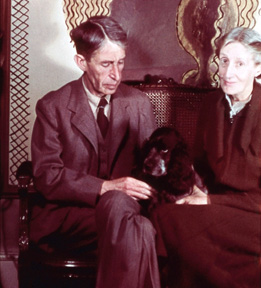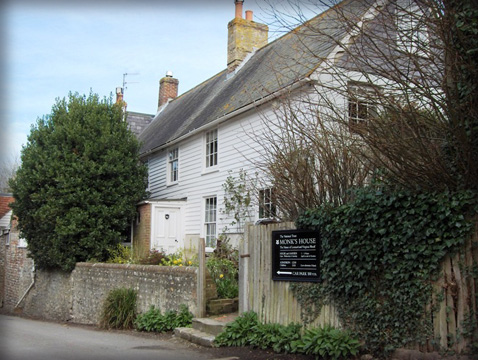|
Village in the jungle:
Woolf portrays a multitude of themes
by W.T.J.S. Kaviratne
Leonard Woolf was born in 1880 in Kensington, London, England. He was
the third of ten children born to Soloman Rees Sidney Woolf and Marie
Woolf.
|

Leonard Woolf and Virginia Woolf |
Leonard Woolf was educated at St. Paul’s School, London and won a
classical scholarship in 1899 and gained admission to Trinity College,
Cambridge.
Leonard Woolf was a political theorist, author, publisher and a civil
servant and identified as a liberal intellectual and was in the habit of
carrying 70 volumes of complete works of Voltaire in his luggage during
his travels.
During his university career in Cambridge his close associates were
Lytton Strachey, John Maynard, Clive Bell, E.M.Forster, Desmond Mccathry
and Thoby Stephen.
They formed ‘Bloomsbury Group’ comprised of intellectuals of the
calibre of Virginia Woolf who was the wife of Leonard Woolf.
Just after his graduation In the year 1904 Leonard Woolf came to Sri
Lanka (then Ceylon) and became a cadet in the Ceylon Civil Service under
the British Colonial Administration.
First he served in the Jaffna peninsula and later in Kandy and again
in the year 1908 he was promoted Assistant Government Agent of
Hambantota district considered as the least developed district in the
country.
After serving three years in the Hambantota district as the
Government Agent out of seven years stay in Sri Lanka , Leonard Woolf
left Sri Lanka in 1911 and got married to Virginia in 1912.
Woolf studied both languages of Tamil and Sinhala which facilitated
him in his communication with the villagers of grass root levels.
An analytical study of Village in the Jungle reveals Leonard Woolf's
mastery of Sinhala colloquial expressions of simple rural folk of Sri
Lanka.
He has made use of expressions of the villagers in conversation
during their day-to-day activities and also the filthy language when
they lost their temper. ‘When the belly is empty the mouth talks of
rice.’‘Vesi! vesi mau ! (How Silindu reacted when his wife Dingihami
gave birth to twins of two girls the characters of Punchi Menika and
Hinnihami in the novel.)
In addition, Woolf’s exceptional knowledge on Buddhism, Jataka
stories, hinduism, superstitions, rituals, traditions, customs and
agricultural methods of the country helped him in creating an authentic
milieu to his tragic narration of ‘Village in the Jungle’ published in
1913.
‘The Buddha said, kill not at all, kill nothing. It is a sin to kill.
(This was the sermon given by by the old man to Silindu on his way to
prison after killings.) Woolf had implied the effects of redemption
taken place in the mind of Silindu just after listening the basic tenets
of Buddhism.
‘The Village in the Jungle’ (Beddegama) compiled by Woolf can be
identified as a tragedy of vast dimensions unfolding the stark reality
of every facet of lives of rustic communities exploited by numerous
forces including outside influences.
It is not an exaggeration to say that the reader of the novel
‘Village in the Jungle’ never feels leaving it till the last page which
is of highly emotive in nature.
Evil forces lurking in the jungle, corruption rampant among the
members of the administrative hierarchy and superstitions, effects of
fate, poverty and hunger, alienation, exploitation and discrimination of
simple villagers are the numerous themes highlighted by Woolf in his
novel.
|

Monk's House’ where Leonard Woolf and his wife Virginia
Woolf lived in Rodmill, London |
‘A man may wash himself clean of oil, but however much he rubs
himself he will never rub off fate.’(Chapter vii.)
Corruption
Woolf had constantly highlighted the corruption rampant among the
peons, koralas and jail guards who were in the habit of obtaining bribes
even to provide some information as experienced by Punchi Menika when
she reached the Prison of Tangalla.
Mudalali Fernando tried to obtain a sexual bribe from Punchi Menika
to relieve their family of debts and to offer her husband Babun a job as
a gambaraya This was the situation during the Colonial era in Ceylon but
now in post independent Sri Lanka the situation has become worst.
The novel can be considered a treatise on the socio-economic study
comprising every aspect of the lives of the people of a remote hamlet in
Ceylon under the British Colonial Administration.
‘Beddagama’ was the name of the village in the jungle and it
originally comprised 10 wattle and daub huts and at the end Woolf had
given a vivid description of how the last house where Punchi Menika
lived in isolation disappeared.
When she was struggling for survival in her hut all alone Punchi
Menika reminisced on the evil powers and devils reigning in the jungle.
This was constantly reminded to her by Silindu whenever she was with
him in the jungle.
‘Did I not often tell you of the devils of the trees that lurk for
you by the way?
I have stood by you against them in the day. I have held you in my
arms when they howled about the house at night.’
Woolf had symbolically portrayed the evil forces of the jungle and
the effects of fate in his narration.
‘When the end was close upon her a great black shadow glided into the
doorway.
Two little eyes twinkled at her steadily, two immense white tusks
curled up gleaming against the darkness.’
‘Appochchi, Appochchi’ she screamed. ‘He has come, the devil from the
bush.
He has come to me as you said. Aiyo! Save me, save me! Apochchi!,
were the last words of Punchi Menika.
Woolf had woven a closely knit story based on a family alienated and
discriminated by the rest of the families of Beddagama.
Silindu was the protagonist of the story and he and his two daughters
Hinnihamy and Punchi Menika were inextricably interlinked to the jungle
and its evil forces, devils and its wild animals.
Unseen forces
In addition to the unseen evil forces lurking in the jungle the
outside intruders to Beddagama brought endless problems to their family.
Silindu and his family were fully aware of the nature of the jungle
and lived along with the evil forces and the devils suffering silently
and never making an attempt overcome them.Silidu mistakenly believed by
killing of two intruders to his family could put an end to all the
misery.
Woolf had attributed misery, sorrow and tragedy destroyed the peace
and harmony of Silindu’s family and the disintegration of the whole
village to the outsiders who intruded Beddagama in order fulfill their
vicious desires.
Throughout the story Wolf had given detailed descriptions about the
abject poverty perpetual starvation and the deaths occurred on daily
basis due to the affliction of malaria.
This was the atmosphere that pervaded the villagers of Beddagama in
addition to the catstrophic effects caused chiefly by the non-
availability of rain water for chena and paddy cultivations. ‘Usually
the villagers lived entirely by cultivating chenas.’(Ch. 1) ‘hunger and
the fear of hunger always lay upon the village.’
‘It was only for a few months each year after the crop was reaped
that the villagers knew the daily comfort of a fully belly.’
Woolf could gather vital information during his frequent circuit
visits to remote villages of Hambantota district.
Diary notes
‘Village in the Jungle’ is based on his diary notes he had made
during his visits to the remote villages of Hambantoa district.
His unique knowledge on chena cultivation is evident by the authentic
description given in the first chapter of the novel. ‘In August every
man took a katty and went out into the jungle and cut down the
undergrowth, over an acre or two. Then he returned home. In September he
went out again and set fire to the dead undergrowth.’ As a writer deeply
involved in political ideology of Liberal Party and a keen student of
sociology, Woolf put into practice his knowledge when he assumed duties
as the Government Agent of Hambantota.
Even though he was a British national he visited the remote village
areas to gather firsthand information of the issues affecting the
marginalised rural communities of the Hambantota district. Prof. Yasmin
Goonaratne backed by her academic expertise on oriental and occidental
literature and cultural diversities has done a comprehensive research on
the conflict that emerged in between the two cultures which is vividly
portrayed by Woolf in his narration on Beddagama.
The themes depicted in the novel bear some parallelism to the themes
highlighted in the novels of Rudyard Kipling, Joseph Conrad and
E.M.Foster belong to the genre of British Colonial literature.
|

